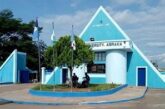
Tertiary Education Trust Fund (TETFund) Board Chairman Aminu Bello Masari and Executive Secretary, Sonny Echono, have restated the fund’s commitment to quality education through enhanced programmes for national capital, economic growth, entrepreneurship, and global competitiveness.
They spoke in Lagos yesterday during an engagement with education stakeholders in a town hall meeting.
Stakeholders at the meeting included members of National Assembly, commissioners for Education and their representatives, vice-chancellors, rectors, administrators of government-owned tertiary institutions, leaders of academic, students’ unions, non-government organisations in the education sector, media managers and traditional ruler.
Director-General, Centre for International Advanced and Professional Studies (CIAP), Prof. Anthony Kila and ARISE TV News Anchor Dr. Reuben Abati gave recommendations on how to strengthen the fund.
Others also spoke on how the agency could tackle its constraints and challenges.
Masari said the forum reflected TETFund’s commitment to openness, accountability, and inclusive governance in line with the Renewed Hope Agenda of President Bola Ahmed Tinubu.
He explained that the fund believes that tertiary education flourished best when stakeholders engage in a shared conversation about its direction, challenges and potentials.
The board chair said from inception, TETFund had been guided by an enduring mandate—to rebuild, strengthen, and modernise Nigeria’s tertiary education landscape.
He said: “Over the years, the fund has indeed become synonymous with landmark projects that define the skylines of our campuses across the country. But let me state clearly, TETFund is not just about building physical structures—something we have done exceptionally well in all our beneficiary institutions. More importantly, TETFund is about deepening academic standards, strengthening institutional capacity, and positioning Nigeria’s higher education system to compete proudly and effectively on the global stage.
“Our investment strategy has, therefore, evolved to embrace a holistic vision of tertiary education—one that balances infrastructure with human capital development, research, innovation, digitisation, entrepreneurship, and global competitiveness.
“A central pillar of our work remains the training and retraining of academic staff. Thousands of lecturers across universities, polytechnics, and colleges of education have benefitted from TETFund-funded Master’s and PhD programmes.
“The Board of Trustees, he said, has expanded support for: TETFAIR (TETFund Alliance for Innovative Research), which nurtures innovators and has already produced over 200 prototypes with strong commercialisation prospects; research for Impact (R4i), which equips researchers with the tools to convert ideas into market-ready products, benefiting 939 Nigerian academics so far; Multidisciplinary Research Laboratories, established across the geopolitical zones, providing world-class facilities for advanced scientific inquiry.
Other included Centres of Excellence, which focus on strategic research areas such as agriculture, engineering, ICT, health sciences, and environmental sustainability, the Nigerian Education Data Initiative (NEDI), which ensures evidence-based policy decisions and system-wide planning driven by accurate, real-time data.
Masari said: “By strengthening Nigeria’s research ecosystem, TETFund is helping to create homegrown solutions, attract global partnerships, and build a knowledge economy fit for the 21st century.
“In response to the demands of a rapidly changing world, the fund has invested heavily in Innovation and Entrepreneurship Hubs.
“These facilities house: Electronics and Robotics Laboratories: 3D Printing and Laser Technology Units; Renewable Energy Labs; Biotechnology and AI Centres; Creative and Leather craft Workshops and Recycling and Upcycling Platforms.”
Echono said the world is embracing global knowledge economy – meaning that knowledge, information, skills and talents have replaced natural resources that used to dominate the global economy.
He said with many countries experiencing decline population, Nigeria, with one of the world’s fastest-growing population and 65 percent of its citizens being young people, is positioned advantageously.
Echono said: “With technological advances making remote work easier, Nigeria has the potential to supply manpower to the world. This trend is already visible, as Nigerian talent is in high demand internationally.
“If the country invests in its people, many can work remotely for global companies while remaining at home, while others who travel abroad will continue to remit money back home,” he said.
Kila presented 10 practical recommendations that that would help make TETFund fit for the future.
“These include establishing a clear, visible national framework for research alignment; implementing performance-based funding, decentralise disbursement and ensure timelines; investing in digital infrastructure; must fortify audit and transparency systems; and TETFund must support curriculum modernisation while also fostering pure intellectual pursuits.
Others are promotion of competitive research clusters; encourage and support localisation and intrastate, as well as regional, collaborations between institutions; and enhance faculty welfare and academic professional development.”




